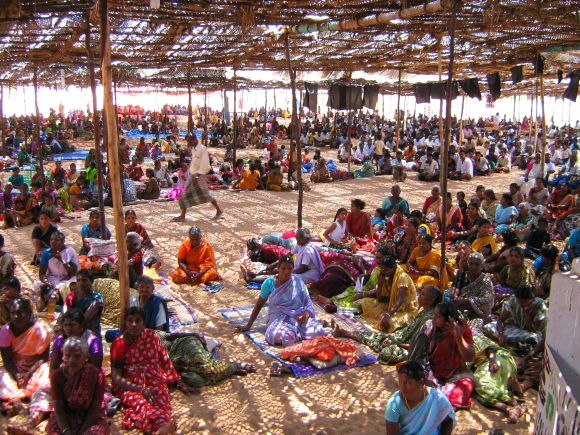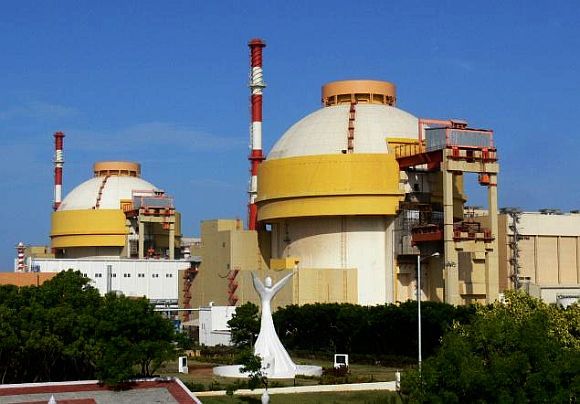
Rediff.com's A Ganesh Nadar visits Idinthakarai, the epicentre of the protests against the Koodangulam Nuclear Power Plant, a day after it was dedicated to the nation.
- 'Would you feel safe if a nuclear power plant was near your house?'
- Why India must pause its nuclear expansion plans
Idinthakarai, in Tamil Nadu's Tirunelveli district, literally means demolished shore and it suits the mood of the village on Thursday, August 11, a day after the Koodangulam Nuclear Plant's Unit 1 was dedicated to the nation.
A pandal, just outside the local church, that once had thousands of protesters flocking there and shouting slogans, is strangely silent.
There are three people in the pandal. One of them, Leela, is writing on a board. She writes '1822' -- the number of days of the struggle against the nuclear plant.
In 40 days it will be five years since they took on the might of the State.
The Idinthakarai agitation succeeded in putting a spoke into the nuclear plant's plans, but the agitation lost steam once Tamil Nadu Chief Minister J Jayalalithaa returned to power.
In Opposition, Jayalalithaa was said to have supported the agitation. In office, the chief minister turned against the agitation. Many protestors had innumerable cases filed against them. Most of their time was spent attending the Valliyoor court.
"How many days are people going to leave work and come here?" asks Leon, an activist present at the pandal. "They can't afford to do that. What did we get out of losing money by not going fishing? Nothing! So men have stopped coming to the pandal."
"They have given up hope of ever stopping the nuclear plant," Leon adds.
"We still come here in the afternoon," says Celine, another activist present. "The men have stopped coming, but we are hopeful this plant will shut down."
Cases were filed against most of the villagers, says Leon, but adds that the state government is not following up on the cases. The villagers know if the anti-nuclear agitation ever recommences with its old fervour, the government would probably revive the cases.
"The villagers of Koodangulam joined our agitation in the beginning," says Leela. "Now only one old man comes once a week to enquire what is going on. They too have lost interest."

"In the future," says another activist, "there are going to be six reactors here. Any one of them could explode. We will be vaporised, you won't even find our bodies."
"The agitation lost steam once S P Udaykumar, who led the agitation, left," says a shopkeeper in the area. "There is no agitation now, just a board and a resting place for the old women in the village."
"He did a lot for us," says Leela, speaking of Udaykumar, "and we are thankful, but we don't understand why he contested elections."
"When he was here," Leela adds, "he used to say politicians belong in the gutter. We are very disappointed with him."
The local church and its priest Father F Jaikumar are said to have supported the agitation. Several cases including one for sedition were filed against Father Jaikumar, who has been transferred from the area. The new priest has apparently been told to stay away from the agitation.











 © 2025
© 2025